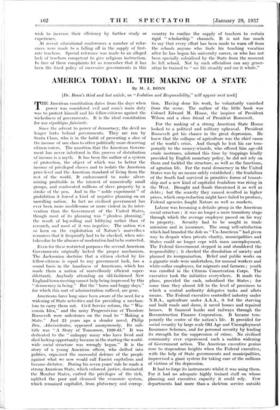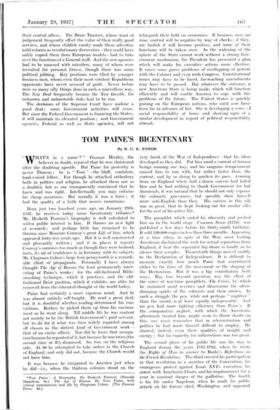AMERICA TODAY : H. THE MAKING OF A STATE
By M. J. BONN
[Dr. Bonn's third and last article, on "Isolation and Responsibility," will appear next week] THE American constitution dates from the days when power was considered evil and man's main duty was to protect himself and his fellow-citizens against the wickedness of governments. It is the ideal constitution for une republique faineante.
Since the advent to power of democracy, the devil no longer lurks behind governments. They are run by Santa Claus, who is in the habit of presenting a slice of the income of one class to other politically more deserving citizen-voters. The assertion that the American Govern- ment has never inferfered in this process of distribution of income is a myth. It has been the author of a system of protection, the object of which was to better the income of privileged classes and to isolate the American price-level and the American standard of living from the rest of the world. It endeavoured to make silver- mining profitable in the interest of numerically small groups, and confiscated millions of slave property by a stroke of the pen. And in the " noble experiment " of prohibition it forced a kind of negative planning on an unwilling nation. In fact no civilised government has ever been more meddlesome or more violent in its inter- vention than the Government of the United States, though most of its planning was " planless planning," the result of log-rolling and lobbying rather than of research, and most of it was negative. The nation wrs so keen on the exploitation of Nature's marvellous resources that it frequently had to be checked, when mis- takes due to the absence of moderation had to be corrected.
Even for these restricted purposes the several American Governments originally lacked the proper mechanism.
The Jacksonian doctrine that a citizen elected by his fellow-citizens is equal to any government task, has a sound basis in the handiness of Americans, which has made them a nation of marvellously efficient super- dilettanti. Anybody attending an old-fashioned New England town meeting cannot help being impressed by this " democracy in being." But the " horse and buggy days," for which this sort of administration sufficed, are gone.
Americans have long since been aware of the need for a widening of State activities and for providing a mechan-. ism to carry them out. Civil Service reform, the " -Wis- consin Idea," and the noisy Progressivism of Theodore Roosevelt were milestones on the road to " Making a State." Just 25 years ago a slender novel, Philip Dru, Administrator, appeared anonymously. Its sub- title was "A Story .of Tomorrow, 1920-35." It was dedicated to the ", unhappy. many who have lived and died lacking opportunity because in the starting the world- wide social structure was wrongly begun." It is the story of a young American officer, who drifted into politics, organised the successful, defence of the people against what we now would call Fascist capitalism and became dictator. During his seven years' rule he made a' strong American State, which enforced, justice, dominated the Member States,_ curbed the privileges* of the rich,. uplifted the poor and cleansed the economic . system,. which remained capitalist, from pliitocracy and corrupr,. tion. Having done his work, he voluntarily vanished from the scene. The author of the little book was Colonel Edward M. House, the inspirer of President Wilson and a close friend of President Roosevelt.
For the making of a strong American State House looked to a political and military upheaval. President Roosevelt got his chance in the great depression. He knew that the collapse of agriculture was the chief cause of the world's crisis. And though he lent his ear tem- porarily to the money-wizards, who offered him age-old crude nostrums, adorned this time by trappings kindly provided by English monetary policy, he did not rely on them and tackled the structure, as well as the functions, of agrarian life. For the rural democracy in the United States was by no means safely established ; the feudalism of the South had survived in primitive forms of tenant- ship and a new kind of capitalist feudalism was rising in the West. Drought and floods threatened it as well as debts ; but the scarcity they caused resulted in higher prices, which crop-reduction might have failed to produce. Federal agencies fought Nature as well as markets.
Labour was becoming a definite group in the American social structure ; it was no longer a mere transitory stage through which the average employee passed on his way to property. Security had to be sought in trade unionism and in insurance. The smug self-satisfaction which had branded the dole as " Un-American " had given way to despair when private charity, municipalities and States could no longer cope with mass unemployment. The. Federal Government stepped in and shouldered the responsibility ; it checked the dissolution of society and planned its reorganisation. Relief and public works on a gigantic scale were undertaken, for manual workers and white-collar employees, for migrants and farmers ; youth was enrolled in the Citizens Conservation Corps. The executive took the initiative everywhere. It made the plans, provided the cash, subsidised the States ; for some time they almost fell to the level of provinces to which a central authority delegates tasks and allots means. The Federal executive controlled industry under N.R.A., agriculture under A.A.A., it fed the starving and built roads and dams, it saved homes and repaired houses. It financed banks and railways through the Reconstruction Finance Corporation. It became tem- porarily the centre of the nation's life. It provided for social security by large scale Old Age and Unemployment Insurance Schemes, and for personal security by lending its strength for the suppression of crime. No civilised community ever experienced such a sudden widening of Government action. The American executive genius rose to stupendous heights when the Federal executive, with the help of State governments and municipalities, improvised a giant system for taking care of the millions of victims of the depression.
It had to forge its instruments whilst it was using them. For it had no adequate highly trained staff on whose phi-lining; and executive capacity it could rely. Few departments had more • than a skeleton service outside their central offices. The Brain 'Trusters, whose want of judgement frequently offset the value of their really good services, and whose childish vanity made them advertise mild reforms as revolutionary discoveries—they could have safely copied them from European models—had to take over the functions of a General staff. And the new agencies had to be manned with outsiders, many of whom were recruited for personal fitness, though there was some political jobbing. Key positions were filled by younger business mer4 whom even their most virulent Republican opponents have never accused of graft. Never before were so many silly things done in such a marvellous way. The New Deal frequently became the New Gamble, for unknown and unknowable risks had to be run.
The decisions of the Supreme Court have undone a good deal ; some Government activities will cease. But since the Federal Government is financing the States, it will maintain its elevated position ; and Government agencies, Federal as well as State agencies, will not relinquish their hold on economies. If business men are wise, control will be negative by way of cheeks ; if they, are foolish it will become positive, and some of their functions will be taken over. As the widening of the sphere of the State cannot work without a strong Gov- ernment mechanism, the President has presented a plan which will make his executive actions more effective. It raises sonic grave problems of overlapping of powers with the Cabinet and even with Congress. Constitutional issues may have to be faced, far-reaching amendments may have to be passed. But whatever the outcome, a new American State is being made, which will function efficiently and will enable America to cope with the problems of the future. The United States is quickly gaining on the European nations, who until now have been far in advance of her. She is developing a sense a social responsibility at home and showing signs of a similar development in regard of political responsibility abroad.























































 Previous page
Previous page